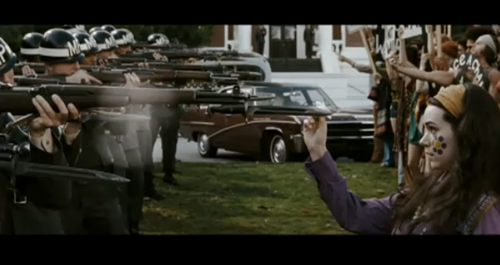Closer

Later Steven Spielberg is more interesting than his wide-eyed golden age. Munich and Catch Me If You Can seem richer than Close Encounters of the Third Kind, E.T., or Jaws.
Not that Spielberg's early work is bad; the problem is that these films are iconic. It's hard to see them solely as films. There's a static air around them. Once Spielberg found his formula, his characters were trapped by the same shots, drowned by the same soundtrack. His newer stuff is much freer.
Spielberg sprang to mind through Super 8, J.J. Abrams' homage to his producer and mentor. More duplication than homage. Watching Super 8 with my son, I was struck by Abrams' literal approach. There are the sweeping close-ups of faces in awe, staring at something mysterious off screen. There is the gang of suburban kids on bikes, each an archetype, all seeking adventure. There are the adults who don't understand their children's world. And of course there is the monster/alien.
Paul Thomas Anderson used Scorsese and Altman riffs for his films. Wes Anderson plumbed whatever was left of Hal Ashby. Even Spielberg tried channeling Kubrick in A.I. Artificial Intelligence (a mixed yet engaging piece of work). But Abrams simply made an early Spielberg film, revved up with CGI.
One real difference is the sound. I don't recall Close Encounters or E.T. being incredibly loud. And there are countless explosions, perhaps even more than in Saving Private Ryan. This is what a contemporary audience expects, or what is routinely offered to them. Had Abrams truly followed his inspiration, Super 8 would be a quieter, quainter effort.
After watching it (and if you do, stay through the credits for one of the best parts of the film), Henry and I talked about the similarities. He referenced E.T., which had an effect on Super 8. But to me the film owes more to Close Encounters. "I've never seen that," Henry said. Really? How did I let that happen? So I got a remastered copy and watched it with him.
I hadn't seen Close Encounters in ages. I'd forgotten how suspenseful the opening half hour is. The scene where an air traffic controller tries to keep a passenger jet from colliding with a UFO remains strong.
Today we'd see the jet and UFO with full THX sound. But Spielberg wisely kept us on the ground, staring at radar, listening to transmissions. Danger is enhanced.
The same is true with the little boy, Barry, who is awoken and lured outside by something we do not see, save for a floating light. His battery-powered toys come to life, a children's record plays, and yet we're apprehensive. Barry's facial reactions to whatever is in the house show awe and delight. He doesn't seem afraid. Should we be?
I was surprised by how much I enjoyed Close Encounters. Part of it was nostalgia, as the story's "present day" is 1977. But it was the movie's low-key approach that changed my mind. This is especially impressive given the big premise, the crowd scenes, the UFOs zipping around.
Richard Dreyfuss is probably the loudest thing in Close Encounters (apart from the mother ship blasting out a window). He's Dreyfuss at his Dreyfussiest: broad gestures, quick turns of body, whines becoming shouts, swift staccato laughter. Dreyfuss fully employed this technique in The Goodbye Girl, winning an Oscar. But a lot of it is on display in Close Encounters.
The other notable feature of Close Encounters is its gentleness. Our fear of the aliens dissolves into acceptance. They are less threatening than the military they meet. As with the Vulcan influence on humans in the Star Trek narrative, one hopes that these aliens will change the humans in their story for the better. That helicopter gunships don't greet the UFOs helps. It's also reflective of a post-Vietnam mindset, when the concept of peace wasn't the joke it soon became in the 1980s, a joke that has coarsened over time.
Super 8 ultimately calls for peace or some kind of rough acceptance, but it blows up a lot of shit to get there. The alien belongs more in Men In Black than in Close Encounters; yet it too wants only a peaceful exit from Earth, a message planted in the minds of those it touches -- well, grabs.
The bad guy is an Air Force officer with a personal agenda: a rogue element, just like those at Abu Ghraib or in Afghanistan's Kill Teams. The military itself is a background character, possibly a benevolent one if only a smarter, competent commander led it (sound familiar?). In this sense, Super 8 fails as a period piece, though Abrams and company did get the clothes, hair, technology and cars right.
"Is that what 1979 looked like?" Henry asked.
"More or less -- except for the large, aggressive alien."
Henry smirked. "I guess aliens in your day were more like hippies."
I laughed. "Kinda like Dead Heads, only less annoying."








